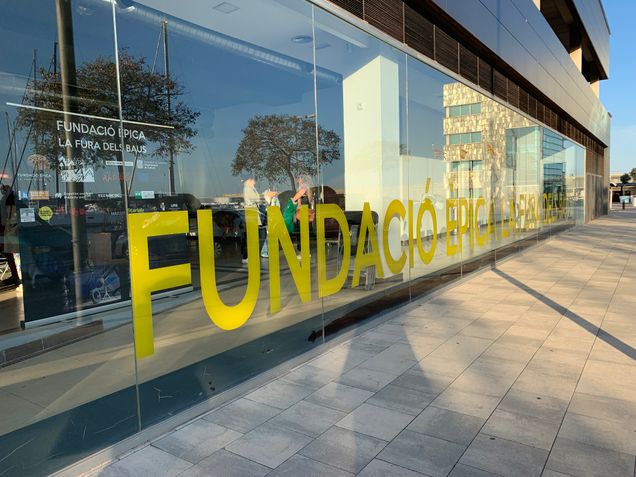March 12. Epica Lab and La Fura del Baus
By Isabelle Fereshteh Sanatdar Stevens
“The future is no longer in one hundred years… It’s in one? Two? Let’s find out,” Fran Iglesias shrugged, shrouded in the light illuminating him from behind, streaming through the floor-to-ceiling windows of the sleek building on the coast of Barcelona. Masts of sailboats in the background, and [redacted] pushed to one side of the open room–part of a confidential exhibition that will open a week after we leave–the setting itself was picturesque, and even if the sun that shone in your eyes didn’t have you squinting, the elaborate exhibitions and performance pieces orchestrated and designed by Epica Lab y La Fura del Baus would.

Founded in 1979, Fundación Èpica is an organization dedicated to examining the relationship between creativity and innovation, and excavating the inextricable links between science, technology, and art. Dedicated not to “final products” so much as the process that “creatives” facilitate for themselves (“creatives” here encompassing folx in all fields, who might be so inclined to discover, explore, and engage with the world in a thoughtful way), Èpica is mainly concerned with one thing: “trying to create new knowledge, not art pieces.”

What was especially exciting about the work being supported through Èpica and La Fura del Baus, the company that exists under its wider umbrella, aside from their technological advancements and achievements, was the reason for its creation in the first place–“Anticipatory arts,” Iglesias explained, “… prepare the people for what’s next.” While Epica and the team claim that they don’t know the future, their method of predicting things is rooted in science and research, and their method of introducing their learnings to society is through simulations that require and inspire emotional and personal engagement. Shakespeare, in Titus Andronicus, writes of a woman silenced literally (after being sexually assaulted, she is physically assaulted) to demonstrate the metaphorical silence often pushed upon folx who experience abuse and assault. So what does Epica do to place audience members into this predicament themselves (or make it so that their brains would believe it to be the case)? They work with chefs to create cotton candy that when combined with the performance art they’re viewing, leads 1% of viewers to pass out and others to lose feeling in their mouth/legs and control of their parasympathetic system. They not only deliver but surpass audience member’s wildest dreams, using science to fuel and foster emotional, physical, and psychological responses. They “prepare people for the future”–opening people’s eyes and “prepar[ing] them to listen” so that when the time comes, they will be more able to engage with new things and not be trapped in the confines of previous lived experience. They create settings and scenarios that are “artificial” in nature, but not in impact.

If there’s one thing to expect when engaging with them and their work, it’s to know that your expectations are probably wrong–they’ll be surpassed in ways you couldn’t even imagine. Èpica will challenge you without allowing you to realize until after the moment passes, that you were even challenged in the first place. I know: I thought I was going to be drenched in water, when Iglesias made as though he was gearing up to toss a glass of water towards me. But he didn’t toss it, and I wasn’t drenched. At the end of the real-time demonstration of the psychological, physical, and emotional responses they’re always working to elicit, I was only in awe of how fluidly he proved his point.